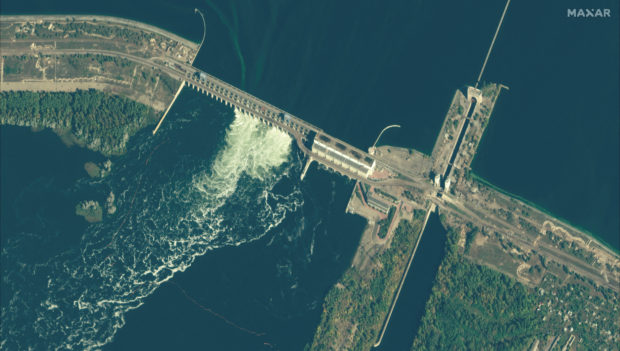Zelensky calls on West to warn Russia not to blow up dam

Satellite image shows the Kakhovka dam on the Dnipro River near Nova Kakhovka in Ukraine, October 18, 2022. (Maxar Technologies/Handout via REUTERS)
FRONTLINE NORTH OF KHERSON, Ukraine – Ukrainian President Volodymyr Zelensky urged the West to warn Russia not to blow up a dam that would flood a large area of southern Ukraine, as his forces prepared to push Moscow’s troops from the occupied city of Kherson.
In a television address, Zelensky said Russian forces had planted explosives inside the huge Nova Kakhovka dam, which holds back an enormous reservoir, and were planning to blow it up.
“Now everyone in the world must act powerfully and quickly to prevent a new Russian terrorist attack. Destroying the dam would mean a large-scale disaster,” he said.
Russia has accused Kyiv of rocketing the dam and planning to destroy it in what Ukrainian officials called a sign that Moscow might blow it up and blame Kyiv. Neither side produced evidence to back up their allegations.
The vast Dnipro bisects Ukraine and is several kilometers wide in places. Bursting the dam could send a wall of water flooding settlements below it, towards Kherson, which Ukrainian forces hope to recapture in a major advance.
It would also wreck the canal system that irrigates much of southern Ukraine, including Crimea, which Moscow seized in 2014.
The alarm has echoes of a World War Two disaster at another huge dam further upriver, which Ukrainian historians said was dynamited by Soviet sappers as their troops retreated, causing floods that swept away villages and killed thousands of people.
Zelensky called on world leaders to make clear that blowing up the dam would be treated “exactly the same as the use of weapons of mass destruction”, with similar consequences to those threatened if Russia uses nuclear or chemical weapons.
U.S. Defense Secretary Lloyd Austin and Russian Defence Minister Sergei Shoigu spoke for the first time since May and a top Russian diplomat said the call was needed to eliminate misunderstandings, TASS news agency reported. The Pentagon declined to offer specifics beyond saying that Austin, who initiated the conversation, emphasized a need for lines of communication amid the war in Ukraine.
‘DIFFICULT DECISIONS’
One of the most important battles of the eight-month-old war is coming to a head near the dam as Ukrainian forces advance along the river’s west bank, aiming to recapture Kherson and encircle thousands of Russian troops.
Ukraine has imposed an information blackout from the Kherson front, but Russian commander General Sergei Surovikin said this week the situation in Kherson was “already difficult” and Russia was “not ruling out difficult decisions” there.
Ukrainian troops manning a section of the front north of Kherson on Friday said there had been a noticeable reduction in recent weeks in shellfire from Russian positions in a tree line that sweeps across an expanse of fields, some 4 km away.
The drop off in shooting and an absence of Russian armour movement in the sector, they said, indicated the Russians were short of ammunition and equipment. The only sign of fighting was the occasional crump of an exploding shell in the distance.
“They’ve been shooting less starting about three weeks ago,” said Myhailo, 42, who like other soldiers deployed with him withheld his last name. “And their drones are less active.”
“It’s probably been about a month there’s been less shelling,” agreed Sasha, 19. “This has to finish at some point. Their ammunition can’t last forever.”
DRONES, MISSILES
The Kremlin on Friday sidestepped a question about whether or not President Vladimir Putin had given an order for Russian forces to withdraw from Kherson.
Ukraine’s armed forces general staff said up to 2,000 newly-mobilised Russians had arrived in the region “to replenish losses and strengthen units on the contact line”.
Russian-installed occupation officials have begun what they say is the evacuation of tens of thousands of civilians across the river from towns on the west bank. They accused Kyiv of shelling a ferry overnight, killing at least four civilians. Ukraine said it had fired at a barge but only after a curfew when no civilians should have been out.
Several buses with evacuees from Kherson arrived on Friday in the north Crimean town of Dzhankoi. One man, who declined to give his name, said the city was under massive shelling.
“They are bombing bridges, everything,” he said.
As Russian forces have faced setbacks on the battlefield since September, Putin has intensified the war. Last month he ordered the call-up of hundreds of thousands of reservists, announced the annexation of Russian-occupied territory and repeatedly threatened to use nuclear weapons to protect Russia.
This month, he began a campaign of attacks using cruise missiles and drones to knock out Ukraine’s power supply ahead of winter – strikes that Ukraine’s energy minister said had hit at least half of the country’s thermal generation capacity.
Kyiv and the West say that amounts to deliberate targeting of civil infrastructure and a war crime.
Moscow has acknowledged targeting energy infrastructure but denies targeting civilians, saying the aim of its “special military operation” is to degrade Ukraine’s military.
U.S. Secretary of State Antony Blinken said at a press conference that Washington had seen no evidence that Russia is interested in ending its aggression toward Ukraine, and instead was “doubling and tripling down.”
Since Thursday, Ukrainians have experienced countrywide calls to reduce electricity consumption and some blackouts, which the authorities say are necessary to fix power stations damaged in the attacks.
Britain, France and Germany on Friday called for a United Nations investigation of accusations Russia has used Iranian-origin drones in attacks, allegedly violating a U.N. Security Council Resolution.
A day earlier, the United States said Iranian troops were in Crimea and had helped fly the drones.
Iran has denied supplying the drones although many have been shot down and recovered making their provenance clear.